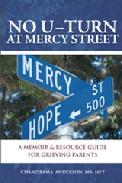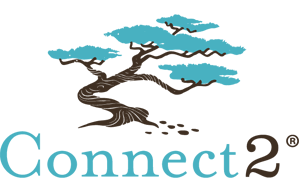No U-Turn at Mercy Street: A Memoir and Resource Guide for Grieving Parents
“ Being a parent is always challenging, but nothing can prepare you for the most devastating parenting challenge of all: the death of your child.
Being a parent is always challenging, but nothing can prepare you for the most devastating parenting challenge of all: the death of your child.
No U Turn at Mercy Street shares one parent’s very personal journey through the grief of losing her unborn daughter, and the labyrinthine path she followed to find a new way to live.
In this honest and touching book, Marriage and Family Therapist Chandrama Anderson shares her personal journal from that most difficult time in her life. And then, from the point of view of a clinical psychotherapist who specializes in working with parents who’ve lost children of all ages, she offers practical steps and specific resources to help you regain your balance, learn to cope, and eventually live beyond survival.
No U-Turn at Mercy Street is an unvarnished look at one mother’s grief journey. For parents coping with the death of a child, this book can assure you that while life will never be the same, it will go on. And for therapists and other grief workers, there is no better book to get you close to how it feels to lose a child. Everything I had hoped would be in this book is here.” — Jan Austin, MFT, Grief Counselor
Buy the book in print or as an electronic book. A portion of the proceeds supports service work. Here’s a selection from the book:
Integrating vs. “Getting Over” Grief
The grieving process is not a linear path with specific stages. It is a messy, convoluted, twisting journey, complete with backtracking and confusing feelings that come and go in fits and starts. At times, it’s like being hit by a tsunami; at others like being on a roller coaster that won’t stop and you can’t get off. Certain scents, sounds, music, or images can trigger grief when we least expect it.
Integrated healing is a process through which we keep the deceased alive in our hearts and minds while we re-engage life. Integrated healing creates a “new normal” life – one without the physical presence of our loved one. This life, whether we fight it or accept it, becomes our new normal; we can’t ever get back to the other life.
During mourning, it is possible that everything we hold to be true will be up for examination, dissection, and perhaps change: relationships, family, friendships, career, our spiritual or religious faith, activities, and the very meaning of existence.
Finding ways to create an ongoing relationship with a loved one who has died can help provide comfort and meaning going forward. There are many ways to approach this. One idea is from Alexandra Kennedy in her book The Infinite Thread: Healing Relationships Beyond Loss (2001). She recommends creating a grief altar in a closeable box, and placing it in a room with a door. The idea is to make time to grieve or remember: by going into the room; closing the door; opening the box—and spending a set amount of time looking at photos, writing, talking with the deceased, or just being present with memories. Another way of maintaining an ongoing relationship is through dreams, imaginings, writing, or sharing stories with others who knew your loved one.
It is possible to come through the journey of grieving feeling we have gained wisdom and compassion. We will never forget what happened, and we’ll always love our child. Memories may be bittersweet. Some of us may even feel that gifts have surfaced that would not have come to fruition without the death of our child. To others, this idea is abhorrent. Again, all of these feelings are normal. And at unexpected moments the waves of grief will spill over us again. We strive for meaning in the death, something that may be an ongoing pursuit. Seeking meaning is an existential question for us all, whether we are grieving or not. It may be very difficult to find meaning in our everyday life after our child has died. Take your time. Trust your own process.
SoulCollage of Grief and Healing
Grief is an Emotional Journey, prepared by Pathways Hospice in Sunnyvale, CA
Contact Chandrama with questions, comments, or for a speaking engagements or workshops at chandrama@chandramaanderson.com

